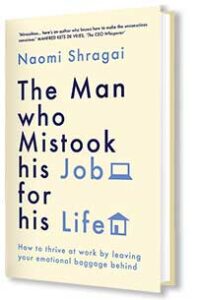Podcast: Play in new window | Download
 We’ve all been frustrated by people who were difficult, angry & arbitrary. And we’ve all had hard-to-please bosses not to mention work colleagues who consistently got under our skin.
We’ve all been frustrated by people who were difficult, angry & arbitrary. And we’ve all had hard-to-please bosses not to mention work colleagues who consistently got under our skin.
It’s easy to point the finger at people who push our buttons – & judge them harshly. But what if there were something about our own psychology that unconsciously influenced how we reacted – & that made us more sensitive to certain people & their behaviors? What if some people trigger us because we have a blind spot to what motivates our own actions & responses to other people?
These are the questions London based psychotherapist Naomi Shragai (Shra-Guy) poses in her new  global bestseller, ”The Man Who Mistook His Job For His Life, How To Thrive While Leaving Your Emotional Baggage Behind,” & her work is so interesting, we asked her to provide some free counseling as our podcast guest.
global bestseller, ”The Man Who Mistook His Job For His Life, How To Thrive While Leaving Your Emotional Baggage Behind,” & her work is so interesting, we asked her to provide some free counseling as our podcast guest.
Few of us recognize this, but every working day we replay & re-enact conflicts, dynamics & relationships from our past. We spend eighteen or more formative years living with our family & building our personality, & some of that experience unconsciously plays a huge role in how we interact with people we work with. For example, we might be driven to please a demanding boss without realizing it’s really our never-satisfied father whose approval we’re seeking. Without any awareness, we act on repressed experiences rather than actual realities – & this behavior is very often the source of confusion & often friction at work.
While Shragai very much wants us all to discover the childhood influences that still unwittingly hold sway over as adults, she also points out that what is true for us is true for all. Everyone around us is unwittingly operating out of their childhood selves when it comes to work. We’re are all trapped in our own upbringings & the patterns of behavior we learned while growing up. And this can at times lead us to misinterpreting people along with situations we’re in.
The leadership win that comes from listening to this episode will be profound not only because you’ll come away with greater understanding of your own behavior at work, but also because you’ll learn better ways of navigating situations with your bosses, employees & peers who previously might have triggered a negative reaction.
Shragai’s wisdom will prove invaluable & she summarizes our discussion – not to mention her book – this way: “If you want to understand your colleague’s irrational behavior, you must first understand your own.”




